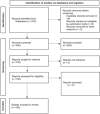A Systematic Review of the Outcomes of Utilization of Artificial Intelligence Within the Healthcare Systems of the Middle East: A Thematic Analysis of Findings
- PMID: 39720235
- PMCID: PMC11667773
- DOI: 10.1002/hsr2.70300
A Systematic Review of the Outcomes of Utilization of Artificial Intelligence Within the Healthcare Systems of the Middle East: A Thematic Analysis of Findings
Abstract
Background and aims: The rapid expansion of artificial intelligence (AI) within worldwide healthcare systems is occurring at a significant rate. In this context, the Middle East has demonstrated distinctive characteristics in the application of AI within the healthcare sector, particularly shaped by regional policies. This study examined the outcomes resulting from the utilization of AI within healthcare systems in the Middle East.
Methods: A systematic review was conducted across several databases, including PubMed, Scopus, ProQuest, and the Cochrane Database of Systematic Reviews in 2024. The quality assessment of the included studies was conducted using the Authority, Accuracy, Coverage, Objectivity, Date, Significance checklist. Following this, a thematic analysis was carried out on the acquired data, adhering to the Boyatzis approach.
Results: 100 papers were included. The quality and bias risk of the included studies were delineated to be within an acceptable range. Multiple themes were derived from the thematic analysis including: "Prediction of diseases, their diagnosis, and outcomes," "Prediction of organizational issues and attributes," "Prediction of mental health issues and attributes," "Prediction of polypharmacy and emotional analysis of texts," "Prediction of climate change issues and attributes," and "Prediction and identification of success and satisfaction among healthcare individuals."
Conclusion: The findings emphasized AI's significant potential in addressing prevalent healthcare challenges in the Middle East, such as cancer, diabetes, and climate change. AI has the potential to overhaul the healthcare systems. The findings also highlighted the need for policymakers and administrators to develop a concrete plan to effectively integrate AI into healthcare systems.
Keywords: artificial intelligence; data mining; deep learning; health policy; machine learning.
© 2024 The Author(s). Health Science Reports published by Wiley Periodicals LLC.
Conflict of interest statement
The authors declare no conflicts of interest.
Figures
Similar articles
-
Artificial intelligence for breast cancer detection and its health technology assessment: A scoping review.Comput Biol Med. 2025 Jan;184:109391. doi: 10.1016/j.compbiomed.2024.109391. Epub 2024 Nov 22. Comput Biol Med. 2025. PMID: 39579663
-
Transforming Healthcare in Low-Resource Settings With Artificial Intelligence: Recent Developments and Outcomes.Public Health Nurs. 2025 Mar-Apr;42(2):1017-1030. doi: 10.1111/phn.13500. Epub 2024 Dec 4. Public Health Nurs. 2025. PMID: 39629887 Review.
-
Artificial intelligence technologies and compassion in healthcare: A systematic scoping review.Front Psychol. 2023 Jan 17;13:971044. doi: 10.3389/fpsyg.2022.971044. eCollection 2022. Front Psychol. 2023. PMID: 36733854 Free PMC article.
-
A Systematic Review on the Outcomes of Climate Change in the Middle-Eastern Countries: The Catastrophes of Yemen and Syria.Environ Health Insights. 2024 Dec 13;18:11786302241302270. doi: 10.1177/11786302241302270. eCollection 2024. Environ Health Insights. 2024. PMID: 39679384 Free PMC article. Review.
-
Artificial intelligence (AI) in restorative dentistry: current trends and future prospects.BMC Oral Health. 2025 Apr 18;25(1):592. doi: 10.1186/s12903-025-05989-1. BMC Oral Health. 2025. PMID: 40251567 Free PMC article. Review.
Cited by
-
Nursing Students' Perspectives on Integrating Artificial Intelligence Into Clinical Practice and Training: A Qualitative Descriptive Study.Health Sci Rep. 2025 Apr 21;8(4):e70728. doi: 10.1002/hsr2.70728. eCollection 2025 Apr. Health Sci Rep. 2025. PMID: 40260042 Free PMC article.
-
Opportunities, challenges, and requirements for Artificial Intelligence (AI) implementation in Primary Health Care (PHC): a systematic review.BMC Prim Care. 2025 Jun 9;26(1):196. doi: 10.1186/s12875-025-02785-2. BMC Prim Care. 2025. PMID: 40490689 Free PMC article.
References
-
- Hadley T. D., Pettit R. W., Malik T., Khoei A. A., and Salihu H. M., “Artificial Intelligence in Global Health ‐A Framework and Strategy for Adoption and Sustainability,” International Journal of Maternal and Child Health and AIDS (IJMA) 9, no. 1 (2020): 121–127, 10.21106/ijma.296. - DOI - PMC - PubMed
-
- Bohr A. and Memarzadeh K., “The Rise of Artificial Intelligence in Healthcare Applications,” Artificial Intelligence in Healthcare. Published ahead of print, June 26, 2020, 10.1016/b978-0-12-818438-7.00002-2. - DOI
Publication types
LinkOut - more resources
Full Text Sources




